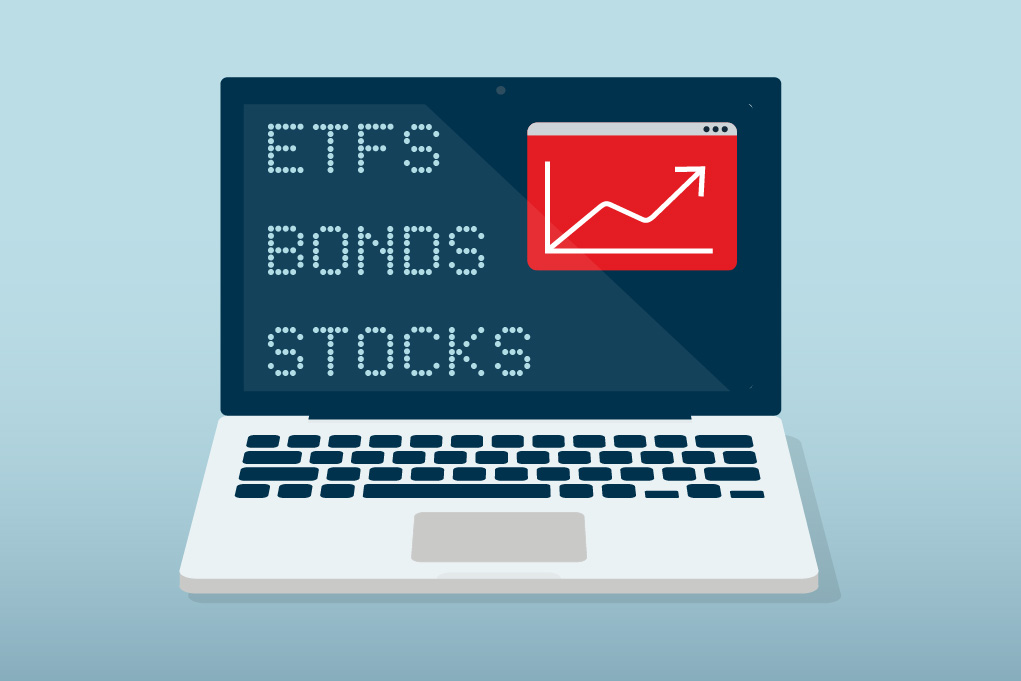About self-directed investing
Self-directed investing options
Self-directed investing (also known as a direct or discount brokerage) offers you a wide variety of choices. You can build your investment portfolio exactly the way you want it. You can include:
- Stocks
- Mutual funds
- Exchange-traded funds (ETFs)
- Bonds
- Guaranteed Investment Certificates (GICs)
- Etc.
Self-directed investing generally offers more choice than investing with the help of an advisor from your financial institution. This is the main difference between the two options.
You’ll have to carry out the trades yourself, like buying or selling securities.
→ Read our article on investing terminology: “Your guide to investments: Read before investing.”
What self-directed investing involves
Being a self-directed investor requires more time and effort than doing it with the help of an advisor. Exactly how much work is involved will vary from one person to the next. It all depends on your goals, your strategy and your areas of interest.
In summary:
- You’ll probably need to devote a significant amount of time if you plan to manage all your assets yourself and try to take advantage of short-term market fluctuations.
- You probably won’t need to invest much time or effort if you’re planning to invest in one or a handful of stocks to create long-term growth.

Further reading
Learn more about the basics of online investing:
→ Our articles to help you get started in self-directed investing
Getting started with self-directed investing
Choosing an online brokerage platform
There are several online trading platforms to help you start self-directed investing. Many large financial institutions offer this service.
While some people will opt for the services offered by their bank, there are other factors that you may want to consider. Here are four:
1. Trading commissions or annual fees
Costs vary depending on the platform. Some transactions may be free, while others are not. Keep an eye on transaction commission fees and administration charges. Some platforms will also offer services free of charge, but on condition that you keep a minimum balance in your account.

Pro tip:
Think about your needs and
compare costs
before settling on a direct
brokerage platform.
2. Features
Most platforms offer similar options and features. In most cases, you’ll be able to carry out the same transactions and access the same products.
The differences lie mainly in the user experience, which includes:
- The platform’s user-interface: is it easy to navigate and find the information you’re looking for?
- Alerts: is it possible to customize alerts based on subject?
Another difference you might notice is the way results and reports are presented. While you should still have access to the same data, some platforms are more user-friendly than others when it comes to how data is presented.
3. Knowledge and training
The amount of information, tools or training offered varies from one platform to another.

Pro tip: Opt for a platform that gives you access to content and analysis that’s relevant for you.
4. Customer service
Access to specialists - to whom you can ask questions or get support - won't be the same everywhere. You may have questions about analysis tools or stock markets, especially at the outset. Remember that getting quality answers quickly is an important advantage.
Self-directed investing, step by step
Once you’ve chosen your platform, you’ll have access to the tools you need to start self-directed investing.
You’ll be able to carry out the following steps, in this order:
- Open a brokerage account
- Link your brokerage account to your bank account
- Transfer funds from your bank account to your brokerage account
- Choose your investments (stocks, bonds, etc.) and your investment vehicles (TFSAs, RRSPs, non-registered accounts, etc.)
- Buy and sell securities
Making the right choices as a self-directed investor
Making good decisions as a self-directed investor means:
- Doing your research
- Staying true to your investor profile
- Reflecting on your goals (e.g., saving for retirement)
A wealth of information about stock values and market trends is available online. To sift the good advice from the bad, you’ll need to use common sense.
Your direct brokerage platform is a reliable source of information. Brokers are subject to regulatory control, and the information they offer must be approved by experts.
Seek out information from a variety of sources but exercise caution when it comes to information from businesses, forums, or sites you don’t recognize or are unsure about. The allure of a profit can lead to bad investment decisions. If something seems too good to be true, it probably is.
The golden rule: If someone promises you a big profit in a short time, take it with a grain of salt.
→ Discover our tips for investing independently, in complete security
While many investors prefer to rely on expert advisors, others swear by self-directed investing. Both approaches have their merits and can help you achieve your financial goals. It’s up to you to decide which option is right for you. To get started as a self-directed investor easily and at a low cost:
